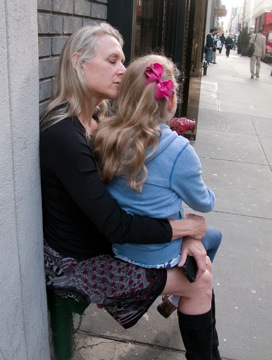*I’ve never removed a post before. But I couldn’t get away from the creepy feeling the original post was giving me. I have kept much of the original content, but rephrased it so that I’m not speaking as though I were my daughter, which I have no right to do, and am instead speaking as her mother, which I am.
My daughter, Emma will be in your class this year. A few days ago, Emma told me she was “scared to go to new school.” Emma loved her teachers and friends from her old school. So I want to introduce you to her. I cannot speak for Emma, I cannot know if everything I write here is completely accurate, but these are things that I have learned over the years, things that are specific to Emma and that may be helpful, at least that is my hope.
Sometimes Emma does not look at you when you are speaking to her, but that doesn’t mean she doesn’t hear you. Her hearing is excellent. She may not know how to process what you’ve said or she may not know what is expected of her. Often if you ask Emma a question, especially if it’s a question she knows the answer to she either won’t answer or will say something nonsensical because she isn’t sure what’s expected of her or why the question has been asked. Sometimes people get nervous and don’t know what to say, so they’ll ask, “Oh Emma, that’s a pretty dress. What are you wearing?” or “What color is that?” These are questions that aren’t being asked for any real purpose or they are testing questions. Typically these are the kinds of questions Emma will not answer.
Change is difficult for all of us and Emma is no exception. Having a written or picture schedule for the day and week will reduce her anxiety. Like everyone, Emma really appreciates having a say in what happens throughout the day. Whenever appropriate allowing her to set a timer for a one, two or five-minute warning before a change in activity will go a long way in helping her do what she needs to prepare herself. Usually Emma will go along with any change if she’s given sufficient warning.
General Disposition:
Emma loves people. She is gregarious. Her fall back position is one of happiness. She is also very sensitive. She can tell if someone is upset, stressed or angry and can become easily overwhelmed by those feelings.
Particularly good at:
Emma is terrific at leading others. She can be extremely persuasive and is a great negotiator. Her negotiating skills are wonderful for math and science and her leadership skills are wonderful motivators.
LOVES:
Emma loves music, dancing, being on stage in front of an audience. Give Em a microphone and she will sing and dance. She loves “talent shows.” She loves any game involving running, swimming, holding her breath under water, laughing and being silly. She loves playing versions of “Duck, duck, goose” or as Emma would say, “Raincoat, raincoat, umbrella!” Musical chairs is another favorite, dance parties, hide and seek, dressing up, bouncing, swinging and going to any playground. Emma is very athletic and very girly. She likes cooking and while she won’t eat most of what she cooks, unless they’re pancakes, she will enjoy the opportunity to cook.
Does NOT like:
Emma gets upset if she is told not to do something she has just done. Example: “You cannot shout!” after she has just shouted is difficult for her. Obviously she CAN shout, she just did, with you right there watching. Telling her she “can’t” is not true and it’s confusing. Instead say, “You mustn’t shout.” Then in a voice that models what you’d like you can say, “Here is how you can speak instead.” By doing that, you are helping to give her other choices. If she is not allowed to do something, be sure to tell her what she can do as an alternative.
Academics:
Emma is fairly new to all academics. Within the past year she has learned to form the letters of the alphabet and is now reading, writing and typing at a 1st – 2nd grade level, likewise with math. Emma loves the Hubble Imax movie and her favorite museum is the American Natural History Museum. She is showing interest in learning about our world, the ocean, the moon, other planets and the universe. She told me last night that she doesn’t want to be an astronaut though, she said she wanted to be a “singer on the stage!”
Needs extra help:
Emma resists academics. They are hard for her and she becomes upset when she makes a mistake. She doesn’t like getting anything wrong. But if you help her succeed, she will flourish. If she is reading and doesn’t know a word, give it 15 seconds or so to see if she can work it out on her own, (don’t say “sound it out” or “try again” because she didn’t learn to read phonetically and while she is able to sound some words out on her own, it won’t help her with all those exceptions like limb and thought.) Emma has a strong desire to learn and an even stronger desire to do things independently. With your help, she can and will succeed.
Frustration and Signs to watch for:
Emma gets a look of panic on her face. She may begin breathing with short sharp intakes and she will often talk to herself in a high-pitched questioning voice laced with anxiety. When Emma is overwhelmed she may shut down and withdraw. She may begin scripting, using set phrases she’s heard. Those scripts may be in context with what’s going on or their connection may not be clear to you, but that doesn’t mean there is no connection, it just means you don’t understand or know what it is. Emma often has trouble processing her feelings and the feelings of others. Sometimes she needs help identifying those feelings, just as we all do. Sometimes she will start repeating things other teachers have said to her in the past in a scolding tone, such as, “No Emma! You may not __________. If you ____________ we will take ________________ away!” When Emma is overwhelmed she has to rely on her scripts as all other words have left her. Try to listen even if the words seem meaningless, she is trying to communicate her feelings of distress to you. Sometimes she might say, “You have to ask for help!” This is what she says when she needs help, but sadly this can confuse those who do not know Emma well. She might also say, “Do you want to go swimming?” Which means she really, really wants to go swimming. If you show her on the schedule when she’ll be able to go she will usually calm down.
It’s too late, the storm has hit!
This is not the time to engage in a power struggle. Emma is not trying to manipulate you or upset anyone. She is simply expressing her frustration in the only way she knows to. Sometimes if she’s very upset she will bite herself or punch herself, usually on the hand or arm, sometimes if things are very bad, she will punch herself in the face. Do not exacerbate this challenging time by raising your voice or telling her “You cannot hit!” or “You cannot bite!” or even “We don’t bite.” (See Does not like paragraph above) Restraining her in an attempt to stop her will not prove helpful either. Emma bites or hits herself because the feelings of frustration are overwhelming her. The pain she causes herself by biting or hitting is within her control and is therefore preferable. It things have escalated to the point where Emma is hurting herself, everyone must try to understand what has happened before things became this derailed and try to prevent them. Sometimes it isn’t possible, but Emma is trying to cope as best she can. When she is calmer you can work on helping her find alternate ways to cope.
What helps you when you feel overwhelmed? What things do you do when you feel anxious, scared or upset and no longer feel you’re able to function? Maybe the things that work for you will help Emma too. Remember, be patient. Showing Emma once or twice will not mean she’s learned, she will likely need to be shown numerous times. Often there is a sensorial component to her upset. She is overwhelmed with feelings or a sensation or too many sensations. She may be tired or hungry, too hot, cold or thirsty. Sometimes a sensory break will do wonders to restore her equilibrium.
Strategies that work well:
Make it into a game! Music can be incorporated into just about any activity and can change anything. High affect and silliness can make something that feels difficult seem fun!
Humor:
Emma loves anything silly and ridiculous. Silly faces, silly dances, playful interactions, games! She has specific jokes she likes to play with specific people. Emma loves to laugh. She loves to make up word games. She enjoys taking a word like “uncle” and changing it to “Jungle.” She will happily tell you that she has a “Jungle Andy and a Jungle Victor.” Come up with silly word games and Emma will join in with glee.
Things that have a tendency to backfire?
If you say, “You have to do ________________. If you don’t, I’m going to take __________________ away” will make her upset and anxious. She will have a hard time concentrating because she will worry about having something she wants taken from her. Instead say, “You can ______________, but first you need to __________________.” That way Emma can concentrate on having/doing something she loves as opposed to taking something away.
Emma’s String:
Emma has a string that she loves. Please do not take away her string or use it as a form of punishment. Her string helps her focus and it makes her feel safe. If you take it away or threaten to she will become completely overwhelmed. Sometimes, when she is writing or typing and needs both hands to do so, you can ask her to set her string near her or in her lap. If you allow her to control where she puts her string she will feel safe enough to concentrate and do her work. Also (a little secret) if you get some string or ribbon and copy her movements in a playful way, you might see and feel for yourself how wonderful it can be and Emma will be delighted that someone wanted to interact with her in a way that she loves.
Food:
Emma does not have any allergies or foods she cannot eat. However she likes to eat the same food everyday. Some food looks, tastes and smells strange to Emma. Please do not make her eat anything she isn’t interested in eating. Please do not tell her she must finish something in order to have something else. If Emma shows interest in something someone else has or is eating and it’s appropriate, do allow her to smell, lick, taste or eat it if she wants to. And please do tell me so that I can find whatever it is and offer it to her at home too. We will pack Emma’s lunch everyday.
One last thing:
Assume competence and respect Emma’s process. Emma can and does learn. She may take longer or less time than another child, but she will learn. She is extremely independent. Show her, help her, let her. You are her role model. Emma has dreams, just as we all do. You can help her achieve those dreams by believing in her.
I am available to talk, discuss and strategize. I am here to help in any way that I can. Nothing is more important to me than my daughter. Please keep in touch with me. Please let me help in any way that I can. There is no detail about Emma’s day that is too small. Do not hesitate in emailing me _____________ or calling _____________.
Thank you so much,
Ariane
Emma performing at her old school

*The above “letter” was inspired by a form letter Ann sent me by Jene Aviram© http://www.nlconcepts.com









